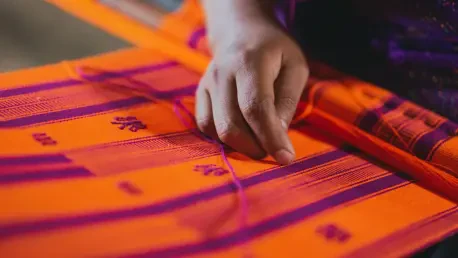In a groundbreaking development for the textile manufacturing industry, a major trade event is broadening its horizons by adding a new location to its roster, marking a significant step toward addressing the needs of emerging markets in South Asia, Southeast Asia, and the Middle East. This biennial exhibition, long established as a cornerstone for innovation and networking in the sector, is now set to host an additional show at the Singapore Expo from October 28-31. This strategic expansion reflects the growing demand for advanced textile solutions in regions eager to modernize operations and meet rising global standards. Organized by ITMA Services and co-organized by Beijing Textile Machinery International Exhibition Co., the event promises to bring together industry leaders, manufacturers, and innovators under one roof. The move to Singapore underscores a commitment to fostering partnerships and providing access to cutting-edge technologies tailored to regional challenges, setting the stage for transformative dialogue and collaboration.
A New Hub for Textile Innovation
The decision to host this prominent textile exhibition in Singapore represents a pivotal moment for the industry, as it taps into vibrant industrial hubs hungry for modernization. With over 770 companies from 31 countries participating across more than 70,000 square meters of exhibition space, the event has already generated significant buzz. Organizers expanded the venue to accommodate the overwhelming exhibitor demand, anticipating over 30,000 visitors during the four-day showcase. Spanning 19 product sectors, the exhibition covers the entire textile manufacturing value chain, from spinning and weaving to garment making, recycling, and automation. This comprehensive approach ensures that attendees gain exposure to the latest advancements, making it a vital platform for sourcing machinery and exploring innovative solutions. The Singapore location is strategically chosen to bridge geographical gaps, enabling manufacturers in nearby regions to connect with global leaders and enhance their production capabilities in response to market needs.
Beyond the sheer scale of the event, the focus on fostering connections between manufacturers, top garment producers, and leading brand owners highlights its role as a catalyst for growth. The exhibition provides a unique opportunity for stakeholders to forge partnerships that can drive efficiency and improve product quality, addressing the pressing demands of a competitive global landscape. Visitors can expect to engage with cutting-edge technologies and software solutions that streamline operations, alongside research and innovation displays that push the boundaries of what’s possible in textile manufacturing. With operating hours designed for maximum accessibility and a mobile app offering tools like exhibitor lists and interactive floorplans for iOS and Android users, the event prioritizes a seamless experience. Standard visitor rates are set at 50 Singapore dollars (approximately $40 USD) for a four-day pass and S$25 ($20 USD) for a one-day badge, though on-site registration fees are higher, encouraging early planning for attendees.
Driving Sustainability in the Textile Sector
Sustainability stands at the forefront of this year’s exhibition, reflecting the industry’s urgent need to adapt to environmental challenges and regulatory shifts. A dedicated half-day forum titled “Accelerating the Green Transition,” scheduled for October 20, will bring together thought leaders, including representatives from the European Commission, to discuss critical topics such as extended producer responsibility (EPR), Digital Product Passport, and eco-design requirements. These conversations are particularly timely as Europe spearheads efforts to steer the textile industry toward a circular economy, pushing for rapid adoption of sustainable practices. The forum aims to equip attendees with actionable insights to navigate these changes, emphasizing the shared responsibility to protect the planet. Industry leaders have noted the importance of collaborative dialogue in balancing growth with environmental stewardship, positioning the event as a key space for shaping the future of green manufacturing.
The emphasis on sustainability extends beyond discussions, as the exhibition itself showcases technologies and processes designed to minimize waste and enhance recyclability across the production chain. Exhibitors will present solutions that align with emerging global standards, offering manufacturers practical tools to integrate eco-friendly practices without sacrificing efficiency or output. This dual focus on innovation and responsibility mirrors the broader industry trend of aligning modernization with greener approaches to remain competitive. For regions like South Asia and Southeast Asia, where industrial growth is accelerating, adopting these practices is not just a regulatory necessity but a strategic advantage in meeting consumer expectations. The event serves as a bridge to connect local manufacturers with global sustainability trends, ensuring they are well-prepared for the evolving demands of markets and policymakers alike over the coming years.
Strategic Expansion and Industry Impact
The choice of Singapore as a new venue for this textile trade show signals a deliberate effort to engage untapped markets and support local manufacturers in optimizing their operations. This expansion reflects a wider industry trend toward globalization and the customization of trade events to address specific regional needs. By establishing a presence in a dynamic hub like Singapore, the exhibition facilitates closer ties with manufacturers in surrounding areas, helping them increase output and improve product quality to meet rising demands. The strong exhibitor response, evidenced by the need to expand exhibition space, underscores the industry’s enthusiasm for this strategic move. It also highlights a collective recognition of the importance of balancing industrial growth with innovative solutions that cater to unique market dynamics, ensuring relevance in a rapidly changing economic landscape.
Looking back, the successful rollout of this event in Singapore marked a significant milestone in the textile industry’s ongoing journey toward modernization and regional engagement. The robust participation from international companies and the focus on practical visitor tools demonstrated a commitment to accessibility and impact. The dedicated sustainability forum proved instrumental in sparking vital conversations around green practices, equipping stakeholders with knowledge to tackle regulatory and environmental challenges. As a platform for networking and sourcing advanced machinery, the event bridged critical gaps, fostering partnerships that promised to shape production standards for years to come. Moving forward, the industry can build on this momentum by continuing to prioritize innovation and sustainability, ensuring that such gatherings remain catalysts for transformation in an ever-evolving global market.









